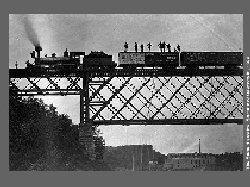
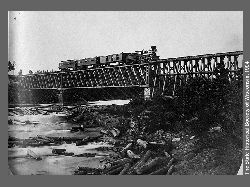
The place which we now call home has always been a popular place
to live. As late as the early 1800's native Chippewa Tribes occupied
a point of land on the east side of Elk lake from time to time.
The place was popular enough with them that it was used for ceremonials
and as a burial ground.


The Wisconsin Central Railroad Company brought the white man and the town we now call Phillips into being shortly after the Civil War. The U.S. War Dept. became concerned about the safety of our Canadian border and ordered a rail line built from southern Wisconsin straight through to Lake Superior. Also lumbermen needed an improvement to river transportation for their products. Elijah B. Phillips and Charles Colby were chosen as the builders. The Phillips and Colby Construction Company was formed and Phillips became the general manager.
In 1876 shanties appeared around the passenger depot built by the Railroad Company. The community was at that time called Elk Lake. This was an unofficial name used to mark its location on the line.
Rooming houses, hotels, stores and saloons came along quickly. A town arose where a forest had stood, a block and a half long and a block wide. On September 23, 1876, the Wisconsin Central Railway platted the town and named it "Phillips" in honor of its general manager. Chippewa Falls was at this time the county seat.
Logging was the main stay of the town. The W.T. Price lumber camps
on the North Fork of the Flambeau river provided employment for
many and customers for merchants. Actually there were several
lumbermen's warehouses tucked in close to the railroad whose names
this writer has not yet found.
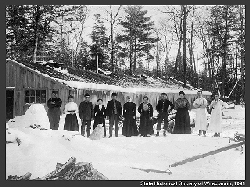
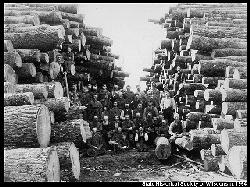
In 1877 and 78, a fight to create a new county started led by W.T. Price. Holders of large tracts of pine forest lands opposed the move. The fear there was higher taxes. The new county did come into being March 20th, 1879, and was named Price after W. T. Price because of his efforts.
An interesting not can be made as to crime in the early days of Price County. It is often supposed that in those early pioneer days crime and lawlessness were worse than in more recent times. However, although the lumber camps often harbored from 2000 to 4000 men within the limits of the present boundaries of Price County, few crimes were committed and few arrest made. In a thirteen year period from 1877 to 1890 it is safe to say that not half a dozen burglaries were committed in the county and only one murder. The accused in that case was acquitted on grounds of self defense.
Older folks that this writer has spoken with agree that folks then treated each other better and with more respect. Even as far into modern times as the 1960's I can still remember not owning keys to our home nor taking keys out of our car ignitions at night.
In the summer of 1894 Phillips had to endure a trial by fire. That summer was one of intense heat and drought. In mid July the timber slashings were tinder dry. Tops of trees, and branches were lying in heaps and hemlock bark was piled high waiting to be hauled to the tannery. Together with this was the regular conditions of a forest in a dry year. Swamps were parched with high brown grass. John R. Davis Lumber Company had 15 million feet of lumber in its yard, and a good share of the winter's cut of logs in decks near the lake. Add to that Fayette Shaw tannery with huge piles of hemlock bark and other small sawmills nearby with their pile of logs. The stage was set in northern Wisconsin and Phillips was in the middle of the powder keg.
On the evening of July 26th an efficient volunteer fire department stopped a fire approaching the north end of Phillips, but no one knew until to late that another fire had started only 10 miles southwest near lake Ten and waited only for the right wind. When the southwesterly wind did spring up there was nothing that could stop the fire. It is said that the fire travailed faster than a horse could run!
An interesting note about the fire is how it started. A drunken man needing money to drink with fought with a plucky wife over a pile of dry bark he wanted to sell. When she refused to let him sell, he set fire to it! The drunk escaped and was never seen again.
Even though the people of Phillips had been living under the threat of fire for many days they were unprepared for the speed of the inferno. First efforts were to save homes and were soon abandon for saving household goods and personal possessions. That to soon was abandon in an all out race for life. A string of box cars was loaded to capacity with women and children and dispatched to Prentice 12 miles to the south. The engineer reported that the smoke was so thick that he could not see the tracks. The train did make it through.
Another large group raced ahead of the fire to the Fair Grounds which are protected on three sides by water. Others found refuge on Eaton's hill and watch from there as the town burned.
The largest group of refugees, entire families with many children ran across the bridge on the north end of town and entrenched themselves at the water's edge protecting themselves from the burning embers and heat.
There was a part of this race for life that turned into tragedy however. Three families, including nine children seeking safety across the lake, were attempting to pole a houseboat out into the lake when the nearby lumber piles caught fire. The heat of that fire created a suction that whirled the houseboat back toward shore. An escape was made from the houseboat in smaller boats but the lake had by then been turned into a churning mass of white caps and the boats were swamped. Only one of the group, a woman, managed to cling to a boat and was saved. Thirteen lives were lost. All lives lost in this fire were in this one incident.
Dawn of the following day brought a drizzle of rain. Only a few charred remnants of buildings remained. Only a handful of houses escaped on the south end. The Lutheran church and a few homes and the brick-walled town of Worcester hall (which was some distance away. Many logging camps and farms were burned along with 100,000 acres of forest.
I note two births during the fire: Frieda Rehagen Haffa - born to Frederich and Otillia Rehagen on July 27th, 1894 at 11:00 P.M. in a root cellar. Veterinarian, John Samer and wife delivered her. Also Arthur Johnson - born to Mr. And Mrs. (Albert & Ella) Johnson on July 27th, 1894 in the P.M. in a horse stall at the Price County Fair Grounds.
Another after fire note is of the John R. Davis Lumber Company. The lumber company needing a steam engine and boiler to power the new mill. A engine was found in St. Louis and was purchased and brought to Phillips and put to work. It happened to be the same engine that powered the Ferris wheel built for the 1893 World's Fair Exposition in Chicago.
Logging has always been an important part of our areas economy. Even though the rail road may have caused the town of Phillips to come into being....it was the loggers that have over all the years of its life fed it. Men who came here first by canoes to carve out a place for themselves in the great forest. Eph. L. Hackett is one name mentioned. He came up river in the fall of 1872 with William Seeburger, (a former Mayor of Phillips), Charles H. Roser and a few Chippewa Indians. They established "Hackett's Farm," at that time the farthest up river lumber camp on the Chippewa waters.
It would be interesting to see some one cook a meal as some had
to back then. Getting breakfast with an overcoat on, a sash about
the face and woolen mittens on hands. The feed of these men was
salt pork and beans, blackstrap molasses and dried apples; flour
salt and tea. No sugar, fresh meat, or vegetables; no butter or
eggs.
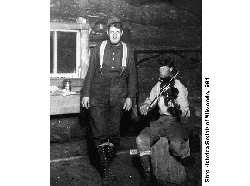
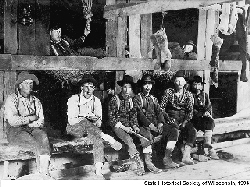
The one pic is of two loggers. One fiddling while the other does
a jig. Then we have a pic of the inside of a bunkhouse.
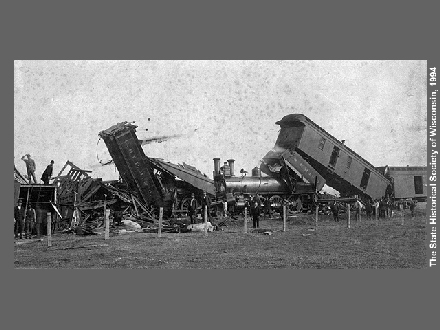
With Your comments
Or Complaints
Email: bpearson@win.bright.net
